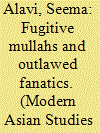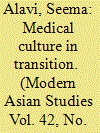| Srl | Item |
| 1 |
ID:
108396


|
|
|
|
|
| Publication |
2011.
|
| Summary/Abstract |
This paper follows the careers of 'outlawed' Indian Muslim subjects who moved outside the geographical and political space of British India and located themselves at the intersection of nineteenth century trans-Asiatic politics: Hijaz, Istanbul and the Arab provinces of the Ottoman Empire, and Burma and Acheh in the East. These areas were sites where 'modern' Empires (British, Dutch, Ottoman and Russian) coalesced to lay out a trans-Asiatic imperial assemblage. The paper shows how Muslim 'outlaws' made careers and carved out their transnational networks by moving across the imperial assemblages of the nineteenth century. British colonial rule, being an important spoke in the imperial wheel, enabled much of this transnationalism to weld together. Webs of connections derived from older forms of Islamic connectivity as well: diplomacy, kinship ties, the writing of commentaries on Islam and its sacred texts in unique ways, oral traditions, madrasa and student contacts. These networks were inclusive and impacted by the tanzimat-inspired scriptural reformist thought in the Arab provinces of the Ottoman Empire. They were not narrowly anti-colonial in tone as they derived from a complex inter-play of imperial rivalries in the region. Rather, they were geared towards the triumph of reformist Islam that would unite the umma (community) and engage with the European world order. The paper shows how this imperially-embedded and individual-driven Muslim transnational network linked with Muslim politics rooted within India.
|
|
|
|
|
|
|
|
|
|
|
|
|
|
|
|
| 2 |
ID:
084837


|
|
|
|
|
| Publication |
2008.
|
| Summary/Abstract |
The essay explores a Greco-Arabic healing tradition that arrived in India with the Muslims and evolved with the expansion of the Mughal Empire. It came to be known as unani in the sub-continent. It studies unani texts and its practitioners in the critical period of transition to British rule, and questions the idea of 'colonial medicine' being the predominant site of culture and power. It shows that in the decades immediately preceding the early 19th century British expansion, unani underwent a critical transformation that was triggered by new influences from the Arab lands. These changes in local medical culture shaped the later colonial intrusions in matters related to health. The essay concludes that the pro-active role of the English Company and the wide usage of the printing press only added new contenders to the ongoing contest over medical authority. By the 1830s this complex interplay moved health away from its previous focus on individual aristocratic virtue, to the new domain of societal well being. It also projected the healer not merely as a gentleman physician concerned with individual health, but as a public servant responsible for the well being of society at large. These changes were rapid and survived the reforms of 1830s. They ensured that 'colonial medicine' remained entangled in local
|
|
|
|
|
|
|
|
|
|
|
|
|
|
|
|